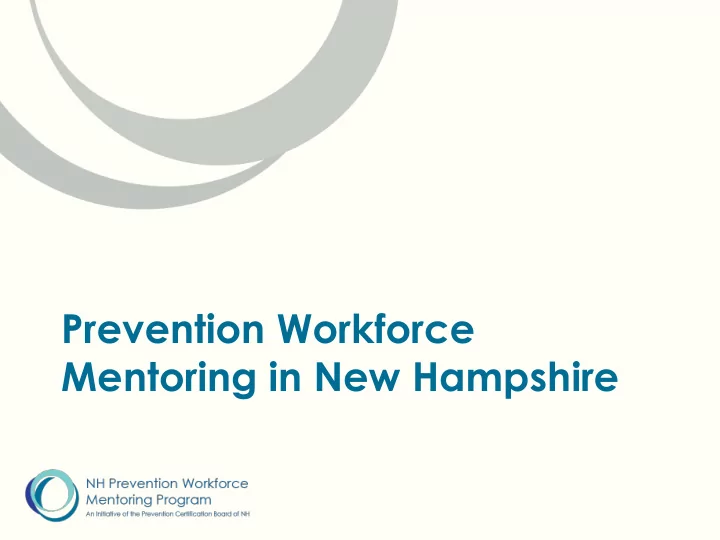

Prevention Workforce Mentoring in New Hampshire
Agenda • Background • Program Purpose and Goals • Cohort Activities – Minefield (Mentor Pair Activity) – Discussion of Prevention Workforce • Envisioning the Future • Discussion/Q&A
Background • History – Identified Gap in Support of Prevention Professionals – Assistance with CPS Process – Workforce Recruitment and Retention
Workforce Needs Assessment • Initial Assessment – Conducted formal assessment of NH’s Prevention workforce • Identified a high level of interest in: – Training in prevention performance domains – Technical skills
Matching Process • Gathered contact information on potential mentor/mentees from assessment • Interview process - conducted phone interviews of interested parties • Matching mentors/mentee pairs – Based on interview process
FRAMING THE EXPERIENCE
Program Purpose The purpose of the NH Prevention Workforce Mentoring Program is to provide a supportive environment for NH’s prevention professionals where both the mentor and mentee can share knowledge and experiences to improve the quality of prevention services and to increase retention in the field .
More on Purpose Provide a formal mentoring opportunity to: – Develop and enhance skills in prevention performance domains and ethics – Support leadership and management development – Knowledge transfer
Program Goals • Professional development of prevention specialists in NH – Support and enhance professional and certified prevention workforce • Provide formal one-on-one support – Mentor guidance – Networking opportunities
Expectations for Mentee/Mentors • Identify needs and set goals • Develop plan to meet on regular basis – Establish a schedule with timeline – Meet at minimum of 4-6 hours per month • May include Face-to-face, phone, facetime/skype, email conversations • Complete Activity Log
Focus • Should relate to Prevention Performance Domains – Planning & Evaluation – Prevention Education & Service Delivery – Communication – Community Organization – Public Policy and Environmental Change – Professional Growth & Responsibility – Ethics
Initial 1:1 Meeting • Assessment of • Develop a plan mentee needs and timeline – Discuss the mentees – Establish some job activities agreed-upon steps to enhance – Current knowledge, that area or skills areas. – Discuss areas of needs
Some best practices for all • Commit Respect • – to regular meetings Be respectful of – and to maintaining each other’s time relationship Share • • Listen Share experiences – – To each other to help broaden possibilities, – Ask questions to aspirations and better understand expectations views/perspectives
Mentor/Mentees Activities
Minefield
Cohort Cross-Sharing Discussion
Other Cohort Activities • Facilitated Lunchtime Cohort Discussion • “Getting to know you” activities with pairs – e.g. leadership personality styles
Mentor/Mentee Activities • Breakfast Meetings • Phone/Virtual • Meetings at conferences or other regularly scheduled events • Email check-ins
Envisioning the Future
Moving Forward Future Cohort Suggestions/Lesson’s Learned Guidelines around Scheduling Draft Schedule at 1 st Meeting More group time / every other month Can meet individually in pairs and groups at same meeting Helpful for Progress Tracking Proximity to Mentor/Mentee TBD - on mentee request/need Suggested Topics Conflict resolution Mentor-only training (conference calls and/or in-person)
Moving Forward • Adaptations for next cohort – More frequent in-person meetings • Every other month – 1:1 Interactions at in-person meetings • More efficient use of time – Increased matching by region • Based on mentee interest – Bringing in outside trainers • Topic selections based on interests of new cohort
Discussion • Questions or comments?
Thank you for your participation! If you have questions, please contact nhpreventcert@gmail.com
Recommend
More recommend